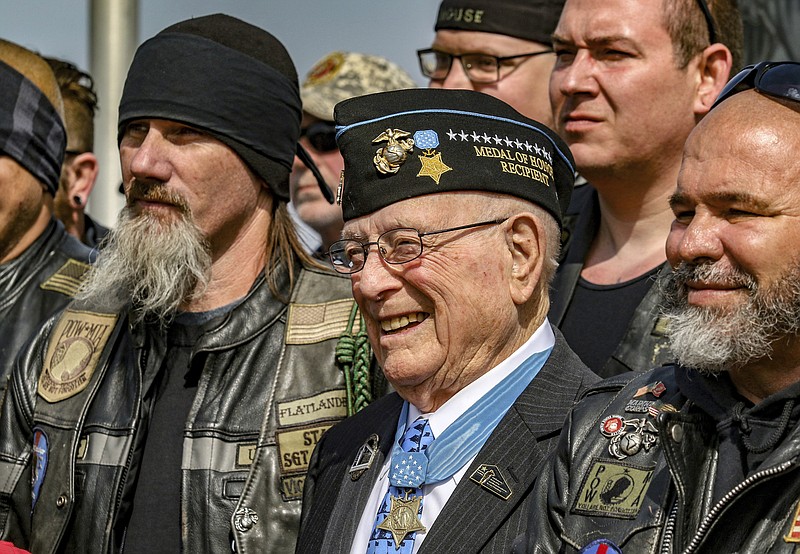By JOHN RABY
Associated Press
CHARLESTON, W.Va. (AP) -- Hershel W. "Woody" Williams, the last remaining Medal of Honor recipient from World War II, died Wednesday. He was 98.
Williams' foundation announced on Twitter and Facebook that he died at the Veterans Affairs medical center bearing his name in Huntington.
As a young Marine corporal, Williams went ahead of his unit during the Battle of Iwo Jima in the Pacific Ocean in February 1945 and eliminated a series of Japanese machine gun positions.
Later that year, at age 22, Williams received the Medal of Honor, the nation's highest award for military valor, from President Harry Truman at the White House.
"For me, receiving the Medal of Honor was actually the lifesaver because it forced me to talk about the experiences that I had, which was a therapy that I didn't even know I was doing," Williams said during a 2018 Boy Scouts recognition ceremony in Fairmont, according to the Times West Virginian.
Iwo Jima was where Marines planted the American flag on Mount Suribachi, a moment captured in one of the most iconic war photographs in history. Williams said he saw the flag from a distance after it went up as troops around him celebrated.
Williams' actions in battle to clear the way for American tanks and infantry were detailed on the military's Medal of Honor website: He was "quick to volunteer his services when our tanks were maneuvering vainly to open a lane for the infantry through the network of reinforced concrete pillboxes, buried mines, and black volcanic sands. Williams daringly went forward alone to attempt the reduction of devastating machinegun fire from the unyielding positions."
Facing small-arms fire, Williams fought for four hours, repeatedly returning to prepare demolition charges and obtain flamethrowers.
"His unyielding determination and extraordinary heroism in the face of ruthless enemy resistance were directly instrumental in neutralizing one of the most fanatically defended Japanese strong points encountered by his regiment and aided vitally in enabling his company to reach its objective," the website said.
Williams remained in the Marines after the war, serving a total of 20 years, before working for the Veterans Administration for 33 years as a veterans service representative.
In 2018, the Huntington VA medical center was renamed in his honor, and the Navy commissioned a mobile base sea vessel in his name in 2020. In February 2018, Williams was joined by 14 other recipients of the Medal of Honor to be honored by the NFL and the nation during the coin toss before the Super Bowl in Minneapolis.
In his home state, Williams was a household name.
"Woody Williams will go down in history as one of the greatest West Virginians who ever lived, and we salute him for everything he gave to our state and our nation," Gov. Jim Justice said in a statement.
Williams was born the youngest of a family of 11 on a dairy farm on Oct. 2, 1923, in the Harrison County community of Quiet Dell. Prior to joining the military, he served in the Civilian Conservation Corps and worked as a teenage taxi driver in Fairmont, sometimes delivering Western Union telegrams to the families of fallen soldiers.
It was that passion that later led Williams and his Louisville, Kentucky-based nonprofit foundation to raise money and establish more than 100 Gold Star Families Memorial Monuments in recognition of relatives of lost service members across the United States, according to his website.
"Woody's family would like to express their sincere gratitude for all of the love and support," the foundation said in a statement. "They would also like to share that Woody's wish is that people continue to carry on his mission."
Although his two older brothers were serving in the Army, Williams wanted to take a different path. He knew some Marines from his area and admired their blue uniforms whenever they returned home. But at 5-foot-6, Williams was rejected because of his height when he tried to join in 1942. A year later, the Marines allowed him in at age 19.
Williams relied on his fiancée, Ruby, to get him through the often anxious times during the war, saying he had to get back to the girl in Fairmont that he was going to marry.
Their marriage lasted 62 years. Ruby Williams died in 2007 at age 83. The couple had two daughters and five grandsons.
Services will be held at 4 p.m. Sunday at the state Culture Center in Charleston. Visitations will be conducted Saturday and before Sunday's service in the nearby Capitol rotunda.
